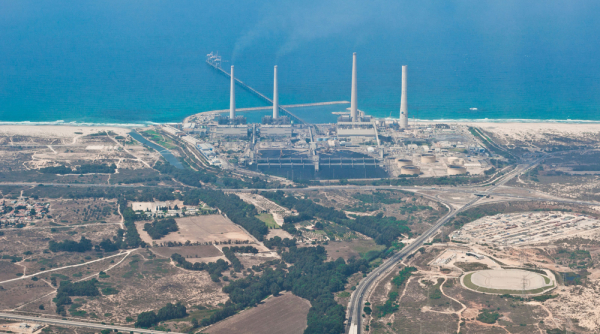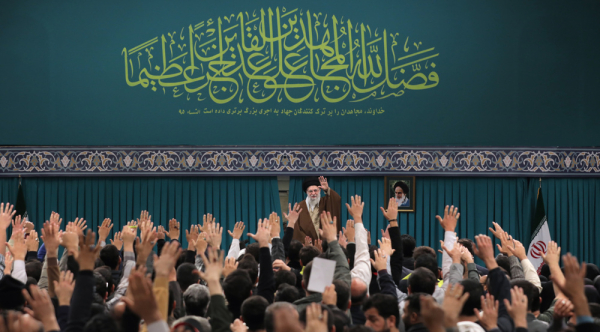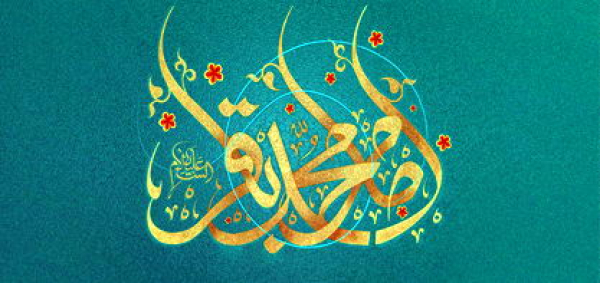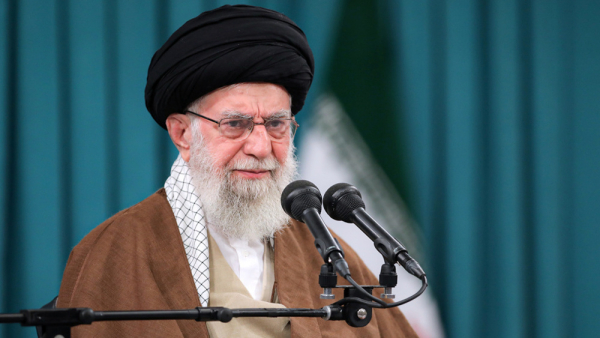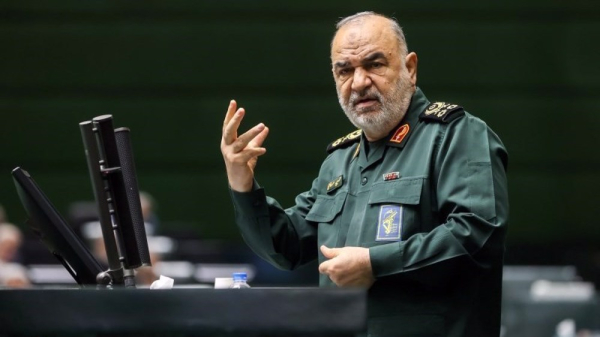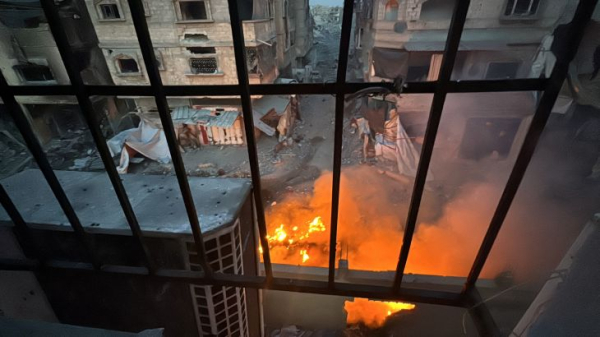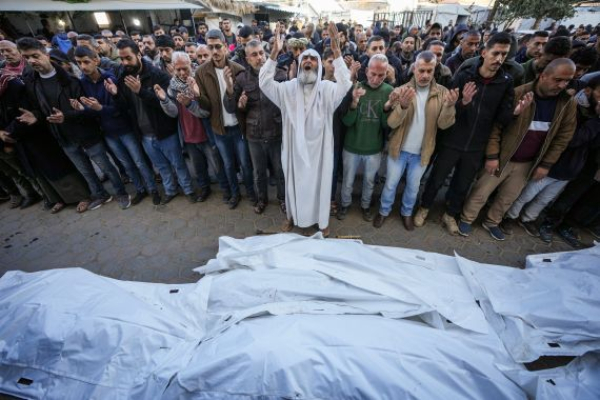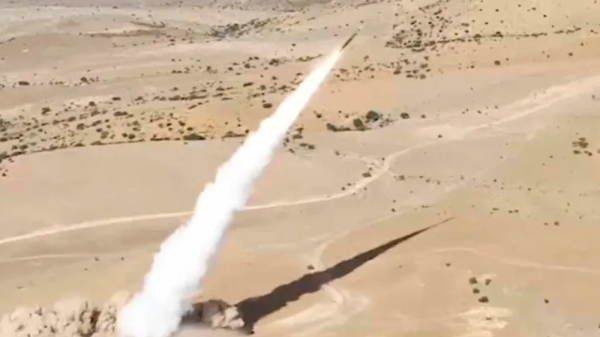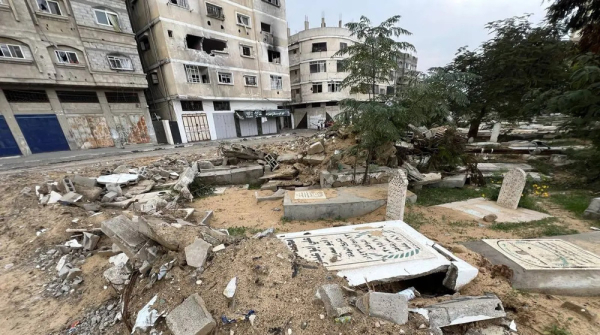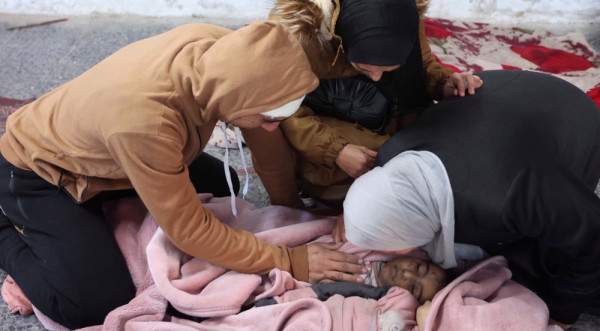zarezadeh
Yemen: Israeli power station in Hadera targeted with hypersonic missile
Yemeni armed forces have claimed responsibility for an operation against a power station located on the Mediterranean coast in the Israeli-occupied territories, in retaliation for the Tel Aviv regime’s genocide against Palestinians in Gaza.
The spokesman for the Yemeni Armed Forces Brigadier General Yahya Saree announced in a televised statement on Sunday that Yemeni missile units targeted the Orot Rabin power station in Hadera, with a Palestine-2 hypersonic ballistic missile.
Saree added that the retaliatory strike attained its desired objectives successfully.
He noted that the Yemeni nation, its leadership, and its armed forces will continue to fulfill their religious, moral, and humanitarian obligations towards oppressed Palestinians.
Saree underscored that Yemeni military operations in support of Palestinian resistance fighters in Gaza will continue unabated as long as the ongoing aggression on the impoverished coastal territory persists and the siege is not lifted.
A member of the Supreme Political Council of Yemen also issued a warning to Saudi Arabia whose forces targeted a border region on Thursday evening, killing a Yemeni civilian and an African refugee.
“Our people have the experience and readiness to confront any escalation of tensions that aim to distract people from the issue of Palestine,” Mohammed Ali al-Houthi said.
“We tell Saudi Arabia that the de-escalation was a golden opportunity to review the wrong assessments that previously got you into trouble,” he said, referring to years of war between the two sides.
“You thought that Yemen would fall in two weeks, and today every other mistake will fail and the Yemeni people will win,” he added.
In March 2015, Saudi Arabia launched a war on Yemen in collaboration with its Arab allies and the support of the US and some Western countries to reinstall a Riyadh-friendly regime and crush the Ansarullah resistance movement.
The Saudi-led coalition, however, achieved none of the objectives and remained bogged down in Yemen for years in the face of stiff resistance by its nation and armed forces.
Yemenis have been carrying out high-intensity and high-precision military operations against vessels linked to the Israeli regime in the Red Sea, Arabian Sea, and Indian Ocean.
They also carried out long-range missile strikes deep inside the occupied Palestinian territories, including Tel Aviv.
Yemen’s arsenal includes long-range ballistic missiles, cruise missiles, and drones capable of hitting targets up to 2,000 kilometers away, which has been on full display in recent months and weeks.
The domestically manufactured missiles have repeatedly penetrated Israel’s much-hyped military systems.
In recent weeks, Yemen has notably intensified its pro-Palestinian strikes on Israeli military targets within the occupied territories, employing advanced hypersonic ballistic missiles.
In an attempt to halt these pro-Palestinian operations and in support of the Israeli genocide, the US and UK have conducted indiscriminate aerial attacks on the Arab country.
However, despite months of heavy airstrikes, Yemeni forces have remained undeterred and continue to target Israeli-linked vessels in regional waters. These attacks have also prompted Yemen to retaliate by targeting West’s military assets stationed off its coastline.
The Yemeni armed forces have said they will not stop their attacks until Israel’s ground and aerial offensives in Gaza end.
Israel has killed at least 45,717 Palestinians, mostly women and children, and injured another 108,856 individuals in Gaza since the onset of the war.
Press TV’s website
"He always sought to revive the resistance": The Leader of the Revolution honored General Soleimani on the eve of the anniversary of his martyrdom.
"He always sought to revive the resistance": The Leader of the Revolution honored General Soleimani on the eve of the anniversary of his martyrdom.
Leader of the Islamic Revolution Ayatollah Seyyed Ali Khamenei has praised as “unique” the sacrifices of Iran’s top anti-terror commander Lieutenant General Qassem Soleimani, who was assassinated alongside his companions in a 2020 US drone strike near Iraq’s International Airport in Baghdad.
“Martyr Soleimani's constant strategy was to revive the Resistance Front. He always tried to revitalize the resistance,” the Leader said on Wednesday.
Ayatollah Khamenei was speaking at a meeting with a group of families of martyrs, veterans, and resistance activists ahead of General Soleimani's fifth martyrdom anniversary on January 3.
The Leader described the top Iranian commander’s role in the fight against terrorism as “matchless” and said his sacrifices and services “must remain in our political teachings.”
He said defending the holy sites was a “tenet” for Martyr Soleimani, who invariably referenced Iran as a “sacred shrine.”
“If these lives had not been lost, if this struggle had not been fought, and if Hajj Qassem Soleimani had not marched through the mountains and deserts of this region so bravely…, there would be no sign of these holy sites today,” the Leader said.
Ayatollah Khamenei said a very important characteristic of General Soleimani was his assessment of the country's issues with a global perspective and avoiding a closed and limited outlook.
“He believed that every important regional and global incident had an impact on the issues in our country, and with this perspective and assessment, he detected the danger from outside the borders and took action to prevent and remedy it.”
Underlining that the developments in the past few years and defending the holy shrines in Iraq, Syria and across the region prove that the Islamic Revolution is “alive,” Ayatollah Khamenei promised that “the truth front” will definitely emerge victorious.
“The defenders of shrines showed that despite the hefty investments and expenses of ill-wishers, the flag of resistance is still flying high and the enemy has not been able to and will not be able to pull down the flag of resistance in Lebanon, Palestine, Syria, Iraq, and Iran,” he said.
“Lebanon is a symbol of resistance, it will be victorious, [and] Yemen is a symbol of resistance, it will be victorious.”
Touching on Syria, the Leader emphasized that the American bases in the Arab country would be trampled upon under the feet of Syrian youth.
“Syria belongs to the Syrian people, and those who invade Syrian territory will undoubtedly one day be forced to retreat in the face of the power of the valiant Syrian youth,” he noted.
The United States assassinated General Soleimani, former commander of the Quds Force of the Islamic Revolution Guards Corps, and Abu Mahdi al-Muhandis, deputy commander of Iraq’s Popular Mobilization Units, in a drone strike near Baghdad International Airport on January 3, 2020.
Both commanders were admired by Muslim nations for eliminating the US-sponsored Daesh terrorist group in the region, particularly in Iraq and Syria.
The US assassination drew a wave of condemnation from officials and movements throughout the world and triggered huge public protests across the region, with Iraqi lawmakers approving a bill two days after the attack demanding the withdrawal of all foreign military forces led by the United States from the country.
On January 8, 2020, the IRGC targeted the US-run Ain al-Asad base in Iraq’s western province of Anbar with a wave of missile attacks in retaliation for the assassination of General Soleimani. According to the Pentagon, more than 100 American forces suffered “traumatic brain injuries” during the counterstrike on the base.
The IRGC, however, says Washington uses the term to mask the number of Americans killed during the retaliation. Iran has described the missile attack on Ain al-Assad as a “first slap.”
Press TV’s website
The Birthday Anniversary of Imam al-Baqir ('a)
Imam Muhammad Baqir (AS), the fifth Imam of the Shiites, was born on the first of Rajab or, according to another version, on the third of Safar in the year 57 AH in Medina.
He is related to Imam Ali (AS) and Fatima Zahra (PBUH) on both maternal and paternal sides. As Imam Sadiq (AS) said, his dear mother was unique in the family of Imam Hassan (AS).
The life of Imam Baqir (AS).
The life of Imam Muhammad Baqir (AS) is divided into two parts. The period before the Imamate lasted for more than 35 years, during the Imamate of his father, Imam Ali ibn al-Hussein (AS). The second part of the Imam's life was the period of his leadership. During this period, he established his own scholarly government. That great man taught in religious universities for 50 years, revealing the truth of religion to students, and telling about the hundred-year history of Islam from the time of the death of Imam Muhammad (AS) to the time of that Imam.
The validity of his Imamate
1. The narration of Prophet Muhammad (PBUH) about the introduction of the twelve Imams (PBUH).
2. A specific narration of Prophet Muhammad Baqir (PBUH) that Prophet Muhammad (PBUH) said.
3. The testimony of Jabir bin Abdullah Ansari to the Prophet (PBUH) about the birth of Imam Muhammad Baqir (PBUH).
4. The confirmation of Imam Baqir (PBUH)'s Imamate by Imam Sajjad (PBUH).
5. The Imam's words about himself and the continuation of the Imamate until the twelfth Imam.
His social and political life
The religious people of Iran during his time helped the Abbasids in the uprising of Imam Hussein (PBUH) and the pressure of the oppressive Umayyad government to eliminate the weak Umayyad dynasty. Therefore, it provided a suitable opportunity for Imam Baqir (PBUH) to reform and strengthen Shia, reject superstitions, and confront the incorrect methods of implementing divine commands.
Media more influential than military in determining outcome of conflicts: Leader
Leader of the Islamic Revolution Ayatollah Seyyed Ali Khamenei has underscored the unparalleled role of media amid ongoing conflicts worldwide, calling for more innovative work to improve the national outlets.
The Leader made the remarks on Tuesday in a message before a media conference in Tehran attended by the head of the Islamic Republic of Iran Broadcasting Organization (IRIB) and its directors.
Ayatollah Khamenei said the ability to properly convey a message and tell the truth played a more influential role than military means in determining the victor of the battlefield.
“You are well aware of the unparalleled role of the media and publicity in the existing global conflicts – which is more than any time,” the Leader stated.
“Today, one’s victory is determined by the ability to convey one’s message and narrative of reality.”
“We must double down on precision and innovation in this crucial arena.”
Peyman Jebelli, the IRIB chief, has already expressed the state television’s unflinching support for the media belonging to the Axis of Resistance under the existing circumstances in Gaza.
Israel has killed dozens of journalists in Gaza since October 2023. Many journalists have also been reported missing, detained, or injured.
Press TV’s website
IRGC chief: Yemenis will ultimately emerge victorious
The chief commander of the Islamic Revolution Guards Corps (IRGC) has praised the Yemeni nation for courageously and valorously defending the Palestinian nation amid the bloody Israeli onslaught in Gaza, stating that the people will ultimately emerge triumphant.
Major General Hossein Salami made the remarks in an interview with Yemen’s Arabic-language al-Masirah television channel on Saturday.
“The Yemenis, as they have resisted with dignity and honor up until today, will continue their resistance by the grace of God and will ultimately emerge victorious.”
He added, “The Resistance Front has not weakened; and everyone is witnessing how Yemenis are competently defending Palestine and staging marches every Friday in support of Gaza.”
The Yemeni Armed Forces announced on Friday that it launched a “hypersonic ballistic missile” targeting Israel's Ben Gurion Airport in Tel Aviv, asserting it had hit its target.
Military spokesperson Brigadier General Yahya Saree said in a televised statement that the strike caused casualties and disrupted air traffic at the airport.
“The missile succeeded in reaching its target despite the enemy's secrecy. The operation resulted in casualties and the suspension of air traffic at the airport,” Sare noted.
Yemen’s Ansarullah resistance movement has been also targeting ships linked to Israel, the United States, or the United Kingdom to force an end to the Tel Aviv regime’s genocidal war on Gaza.
The Yemeni armed forces have said they will not stop their operations until Israel’s ground and aerial offensives in Gaza end.
So far, Israel has killed at least 45,484 Palestinians, mostly women and children, and injured another 108,090 individuals in Gaza.
Press TV’s website
Video shows robots planting explosives near Kamal Adwan Hospital
Many people inside Kamal Adwan Hospital or in its vicinity have been using their phones to document the concerning events.
One video presented to us shows robots in the vicinity of the hospital leaving behind an explosive device. We were told by the person who filmed that video that there were at least four other robots in the vicinity of the hospital.
When we look at the sheer level of destruction, it’s consistent with the footage presented to us, with the fact that the Israeli military has been using these devices to blow up many of the buildings in the vicinity of the hospital.
The witness told us that much of the area around the hospital has been cleared from buildings, the infrastructure destroyed and severely damaged, impeding movement in and out of the hospital.
Many of the essential departments inside the hospital have been rendered unoperational, because everyone is trying to stay alive and protected from all the shrapnel and bullets shot by the quadcopters or fired by the military that are piercing through the walls, injuring many of the medical staff members and patients inside.
Another video shows everyone in one corridor of the hospital, in the middle of the building, away from the windows and balconies and the rooms that are looking over the streets where these explosive devices are planted.
Reporting from Deir el-Balah, Gaza by Hani Mahmoud
Dozens killed, wounded as Israel attacks Gaza hospital, aid convoy
Palestinians pray over the bodies of the victims of an Israeli strike on a home late on Saturday, before the funeral, outside Al-Aqsa Martyrs Hospital in Deir el-Balah, Sunday, December 22, 2024.
Israeli forces continue their attacks on the barely functioning Kamal Adwan Hospital in besieged northern Gaza, detonating remote-controlled vehicles and wounding at least 20 patients and medical staff.
In central Deir el-Balah, Israeli forces launched a drone attack on a convoy carrying aid to starving Palestinians, killing four security guards and raising the death toll of the past day to at least 26.
Israeli Prime Minister Benjamin Netanyahu tells parliament that progress has been made on a deal to reach a ceasefire and free captives in Gaza, but offers no timeline.
Israel’s war on Gaza has killed at least 45,317 Palestinians and wounded 107,713 since October 7, 2023. At least 1,139 people were killed in Israel during the Hamas-led attacks that day, and more than 200 were taken captive.
Yemeni missile strikes chaos, mayhem into central Tel Aviv; triggers stampede that injures 20
The projectile caused missile sirens to ring out throughout several areas in the central part of the territories on Tuesday, the regime’s “Home Front” reported.
The regime’s ambulance service said as many as 20 people were injured during a stampede that was created as illegal settlers crammed Tel Aviv’s streets while running for shelter.
The Israeli military, meanwhile, alleged that it had “intercepted” the projectile “before” its entering the territories’ skies.
The military almost routinely comes up with the claim in all such cases, only to be refuted by Yemen’s Armed Forces.
The forces have markedly intensified their pro-Palestinian strikes against the territories and other Israeli targets.
The operations began following the Israeli regime’s launch of a war of genocide against the Gaza Strip last October.
The brutal military onslaught has so far claimed the lives of more than 45,300 Palestinians, mostly women and children.
The Yemeni strikes have shifted their focus towards Tel Aviv, the Israeli regime’s economic heart, over the past several weeks, with the country’s Armed Forces recurrently announcing successfully hitting the city with ballistic and hypersonic missiles.
‘Declaration of war’
As a means of trying to stop the pro-Palestinian Yemeni operations, the regime and the United States, its closest and most supportive ally, have been conducting many aerial assaults against Yemen, prompting the latter to also start targeting the American military assets that are deployed off the Yemeni coastline.
Washington’s ongoing push against Sana’a most recently featured its deployment of its USS Harry S. Truman (CVN 75) aircraft carrier to the Red Sea as part of a sprawling strike group.
Earlier, Mohammed Ali al-Houthi, a member of the Yemeni popular resistance movement Ansarullah’s Political Council, warned that the carrier’s continued deployment to the waters translated into “declaration of war.”
“The American aircraft carrier’s continued stay carries the message of war, threat, and militarization of the Red Sea,” the official said.
Press TV’s website
No place for dead: The truth behind Israeli razing of Gaza cemeteries and body theft
The Israeli regime has committed 9,905 massacres in the Gaza Strip, including 7,160 attacks on Palestinian families, since the events of October 7, 2023.
The total number of martyrs and missing persons has reached 55,758, including 17,712 children, 12,136 women, and 5,444 martyrs from 1,410 Palestinian families who were completely wiped out.
The report also detailed the impact on the besieged Palestinian territory's medical sector, with 1,059 medical workers and 88 civil defense members martyred, 34 hospitals and 80 health centers shut down, and 162 health institutions and 135 ambulances targeted.
The Israeli occupation forces buried a large number of Palestinian victims inside hospitals, from which at least 520 bodies of martyrs were recovered while others remain under the rubble.
Total infrastructure damage in the Gaza Strip is estimated at 86 percent, including the destruction of 160,500 family homes and 212 shelters, estimated at a total of $37 billion.
Among the data often disregarded is that of 19 of 60 cemeteries in the territory that have been totally destroyed and 2,300 martyrs' bodies stolen, an increase from the 2,000 reported in August.
In November last year, after the Israeli warplanes rained bombs on a cemetery in Deir al-Balah, a Palestinian man took ti X, formerly Twitter, to give vent to his anger and frustration.
“Israel doesn't even want you to have the luxury of having your family visit your grave,” he wrote.
Destroyed cemeteries
At the beginning of this year, international media and human rights organizations published multiple reports about the systematic destruction of multiple cemeteries throughout the Gaza Strip.
A gravedigger in Deir al-Balah was quoted as saying that he buried a total of 137 bodies in a random mass grave on a single day as the cemetery reached its maximum capacity.
UN Secretary-General Antonio Guterres also said that Gaza had become a "graveyard" for hundreds of Palestinian children each day amid the Tel Aviv regime’s refusal to announce a ceasefire.
By verifying photos, videos, satellite images and testimonies, it can be revealed that in Gaza City alone, a total of nine cemeteries were destroyed in the first three months of the Israeli invasion.
Some of those cemeteries were newly created during the ongoing war owing to the excessive number of fatalities and the inability to access main cemeteries in some parts of city.
One of them, the al-Batsh cemetery next to al-Shifa Hospital, located in the neighborhood of northern Rimal in Gaza City, was subjected to complete leveling by Israeli military bulldozers and the majority of the bodies and tombstones were removed, dismembered and looted.
Euro-Med Monitor documented the same Israeli practice at the Ali bin Marwan cemetery in the east, the Beit Hanoun cemetery in the north, the Sheikh Radwan cemetery in the northwest, and the Sheikh Shaaban cemetery in the central-eastern part of the city.
The Geneva-based rights group reported that Israeli military personnel stormed a cemetery in the al-Tuffah neighborhood, not specifying whether it was the Ali bin Marwan cemetery or another one, and dug up more than a thousand graves, removing over 150 freshly buried bodies.
Witnesses confirmed the deliberate leveling and exhumation of bodies from graves at the Beit Hanoun cemetery, as well as the targeted destruction of graves at Sheikh Shaaban cemetery with Israeli military vehicles trampling over the dead bodies.
The Christian cemetery of St. Porphyrius Church was also devastated by the indiscriminate Israeli airstrikes, and similar acts of destruction and desecration were also recorded at the Sheikh Ijlin cemetery and in the Shujaiya neighborhood.
Satellite images reveal the scale of destruction of the Tunisian cemetery in Shujaiya, specifically excavations, parked armored vehicles and the use of the site as a temporary military set-up.
Other cemeteries across Gaza where similar cases of destruction and theft of dead bodies have been documented include the al-Shuhada cemetery in Beit Lahia, the al-Falluja cemetery in Jabalia, the Khan Yunis central cemetery, the al-Qassam cemetery in Nuseirat, the Bani Suheila and Bureij cemeteries.
Limited damage from waves of bombings and shelling was also reported at dozens of other cemeteries, which in some cases resulted in bodies buried in shallow graves due to emergency conditions coming to the surface.
Israeli systematic destruction of cemeteries and theft of dead bodies does not include a number of similar cases involving mass graves, estimated at more than 120 throughout the Gaza Strip.
At the beginning of this year, South Africa raised the Israeli destruction of Gaza cemeteries as part of its case at the Hague-based International Court of Justice (ICJ), arguing that the Israeli regime violated the 1948 Genocide Convention.
Euro-Med Monitor also emphasized that the regime has not spared even the dead in its genocidal war on Gazans, in flagrant violation of the principles of international humanitarian law and the rules of war about the protection of cemeteries during armed conflicts, including the Hague Conventions and the 1949 Geneva Conventions.
Disturbing testimonies
Palestinian testimonies to local and international media confirm that Israeli genocidal actions are not isolated cases nor misconduct of a handful of individuals, but the desecration of graves and the theft of Palestinian dead bodies is an organized phenomenon.
Speaking to Euro-Med Monitor, a Gaza City resident described his and his family's shock when they learned that the body of his buried 20-year-old brother had disappeared from the al-Batsh cemetery.
"The Israeli army not only killed my brother but also went so far as to deny my family any opportunity to visit his grave," he was quoted as saying by the human rights group.
Another resident of Beit Hanoun testified that he and his fellow citizens saw the Israeli army digging up certain graves in the city cemetery and removing bodies and that due to the complete bulldozing, it became impossible to identify the remaining dead bodies.
Identical testimonies were given to Arab media months later by family members from Jabalia who, after the Israeli army withdrew, found an empty family grave in a cemetery near the Indonesian hospital.
They said the bodies of the recently deceased were stolen from multiple graves left open, and that eyewitnesses saw the Israeli theft covertly because soldiers have a habit of shooting at them.
Horrifying testimony also came from the Nuseirat refugee camp in November, where a woman revealed that after an Israeli incursion, she had found her sister's grave in the al-Qassam cemetery dug up and desecrated, with her head sticking out of the ground.
Equally disturbing are the testimonies of innumerable mass graves where the same Israeli acts of desecration and theft have been recorded.
In April, Palestinian Health Ministry spokesman Ashraf al-Qudra reported that dozens of bodies unearthed from the mass graves at Nasser Hospital in Khan Younis, southern Gaza Strip, were decapitated and had their organs and skins removed.
Paramedics and rescue teams who participated in recovering around 400 bodies of civilians from these mass graves reported that some bodies were mutilated with their stomachs open and stitched up, arguing that it was organ theft.
Israeli lame justifications
The Israeli regime's reactions to the aforementioned reports of cemetery destruction and body theft show that they have attempted to ignore, cover-up, or offer false justifications for their actions.
After the first published analysis of the cemeteries' destruction in December last year, journalists from the New York Times requested comment from the Israeli military but received no response.
New York Times, without deeper scrutiny, bought the lame argument as reflected in its reportage.
A month later, after a CNN investigation into the destruction of Palestinian cemeteries, the regime said they "had no choice" but to target cemeteries, falsely accusing the Gaza-based Hamas resistance movement of using them for military purposes.
They tried to justify the extensive digging of the Beit Hanoun cemetery near Khan Yunis city by claiming that there was a tunnel underneath with a Hamas command center.
CNN reporters were allowed a brief visit to the cemetery, after which they reported that despite their search, they were unable to find any tunnel entrance at that location and thus verify the Israeli claims.
The Israeli army took their reporter through an off-perimeter tunnel to an underground shelter they claimed was located under a cemetery, which CNN also questioned.
Press TV website
Iran: Zionist criminals render United Nations ineffectual as genocide continues apace
The head of Iran’s Atomic Energy Organization (AEOI) has criticized the United Nations for failing to stop the appalling crimes committed by the Israeli regime against Palestinians in the besieged Gaza Strip, saying criminal Zionists have effectively paralyzed the world body.
Mohammad Eslami made the remarks during a ceremony honoring the martyrs of the Al-Aqsa Flood and those of the resistance front on Monday in the Iranian capital of Tehran.
“This criminal group (the Zionists) has effectively rendered the United Nations inoperative—an institution which has always strived for human rights and justice. What stance do international organizations, which have repeatedly adopted positions against the Islamic Republic, now take in the face of these crimes? What role can they play? Is there any hope that the United Nations and the Security Council will do something?” he said.
More than 45,000 Palestinians, most of them women and children, have been killed in the genocidal war that began after the retaliatory operation - the Al-Aqsa Flood - staged by Gaza’s resistance movements on October 7, 2023 in response to the regime’s decades of deadly occupation and aggression against Palestinians.
The US, Israel’s number one ally and main supporter, has blocked efforts by the UN aimed at stopping the Gaza war.
In the past year alone, Washington has vetoed four Security Council resolutions calling for a Gaza ceasefire.
“In the recent vote at the United Nations General Assembly, 167 countries voted in favor of the Palestinian people’s right to establish an independent state, while only the United States and at most five other countries opposed it. Nevertheless, today this small number plays a decisive role in international affairs, and the vote of the majority of the world's countries is effectively ignored,” Eslami stressed.
Palestinians want the West Bank as part of a future independent Palestinian state with East al-Quds as its capital. This is while more than 600,000 Israelis live in over 230 illegal settlements built since the 1967 Israeli occupation of the West Bank and East al-Quds.
The international community views the settlements as illegal under international law and the Geneva Conventions due to their construction on the occupied territories.
“In such circumstances, the front of truth and justice, which has always stood against this current, has a clear duty. This front will not only remain steadfast but will continue on its path with even greater strength and determination to hold these criminals accountable,” the AEOI chief emphasized.
Elsewhere in his remarks, Eslami said that dominant countries try to strengthen their own economies by restricting access to advanced technologies in developing countries and hinder their economic growth.
“Since the victory of the Islamic Revolution, our country has consistently faced sanctions. These sanctions have been imposed due to our refusal to comply with the dominant world order and our steadfast commitment to the principles of the Revolution, including independence, freedom, and the Islamic Republic,” he added.
Eslami, however, stressed that Iran must continue the path of progress with effort and determination despite the current challenges.
“By relying on divine grace and continued effort, we can overcome these obstacles and attain greater achievements,” he stressed.
Press TV’s website
